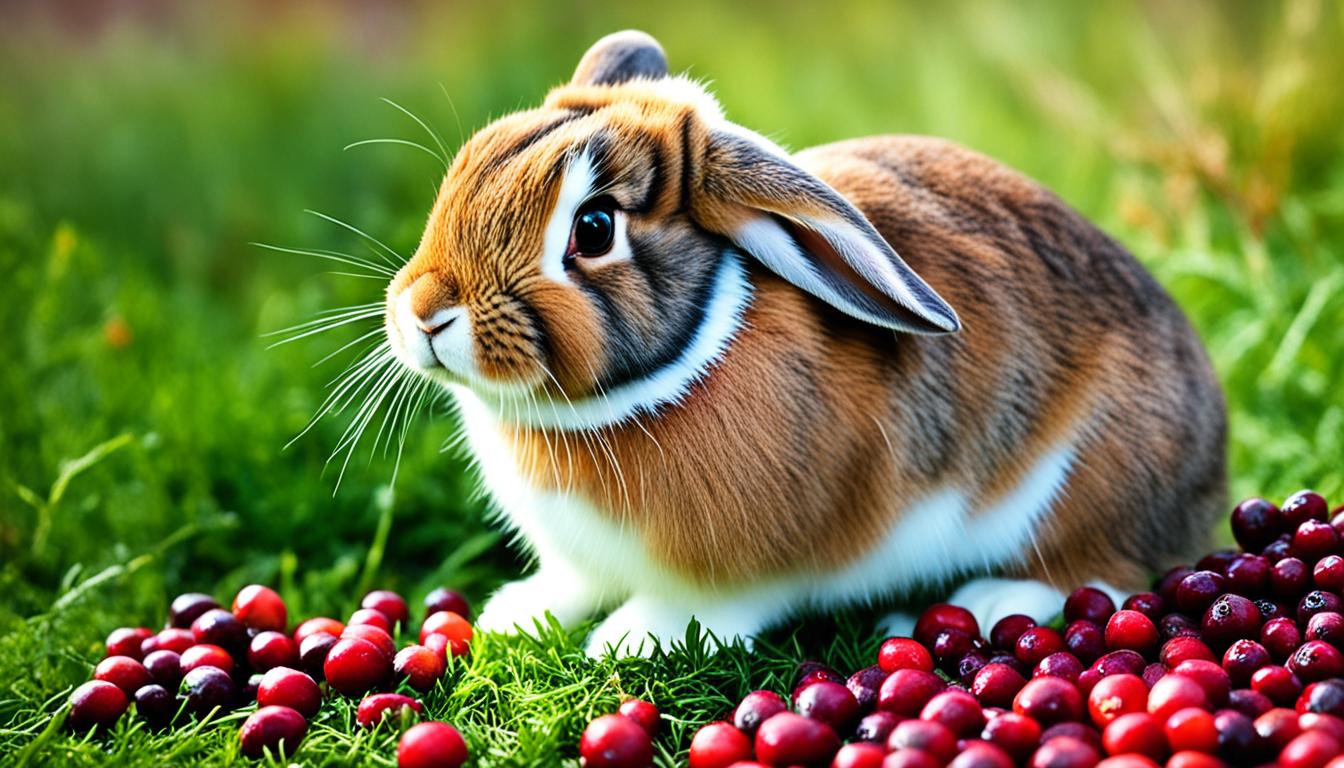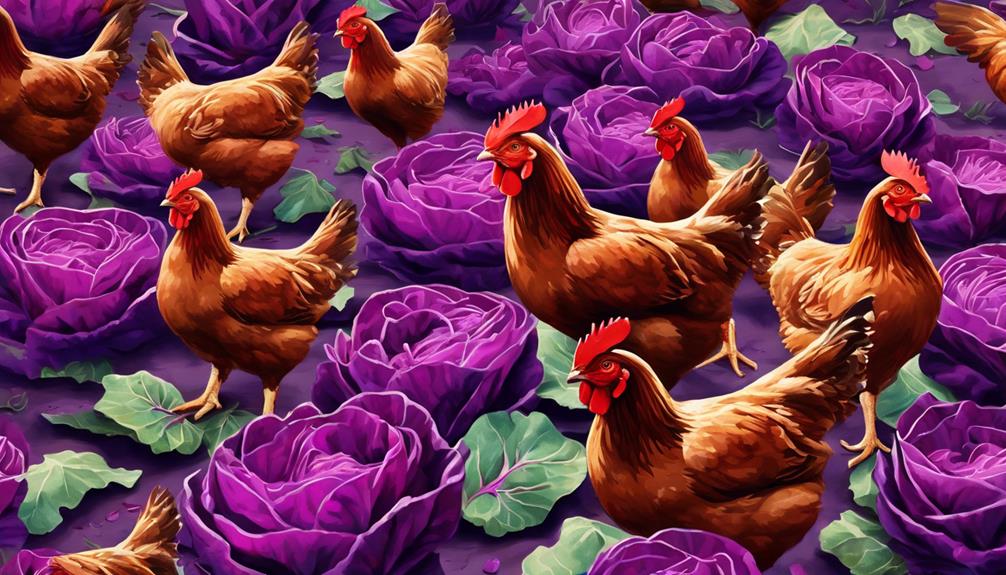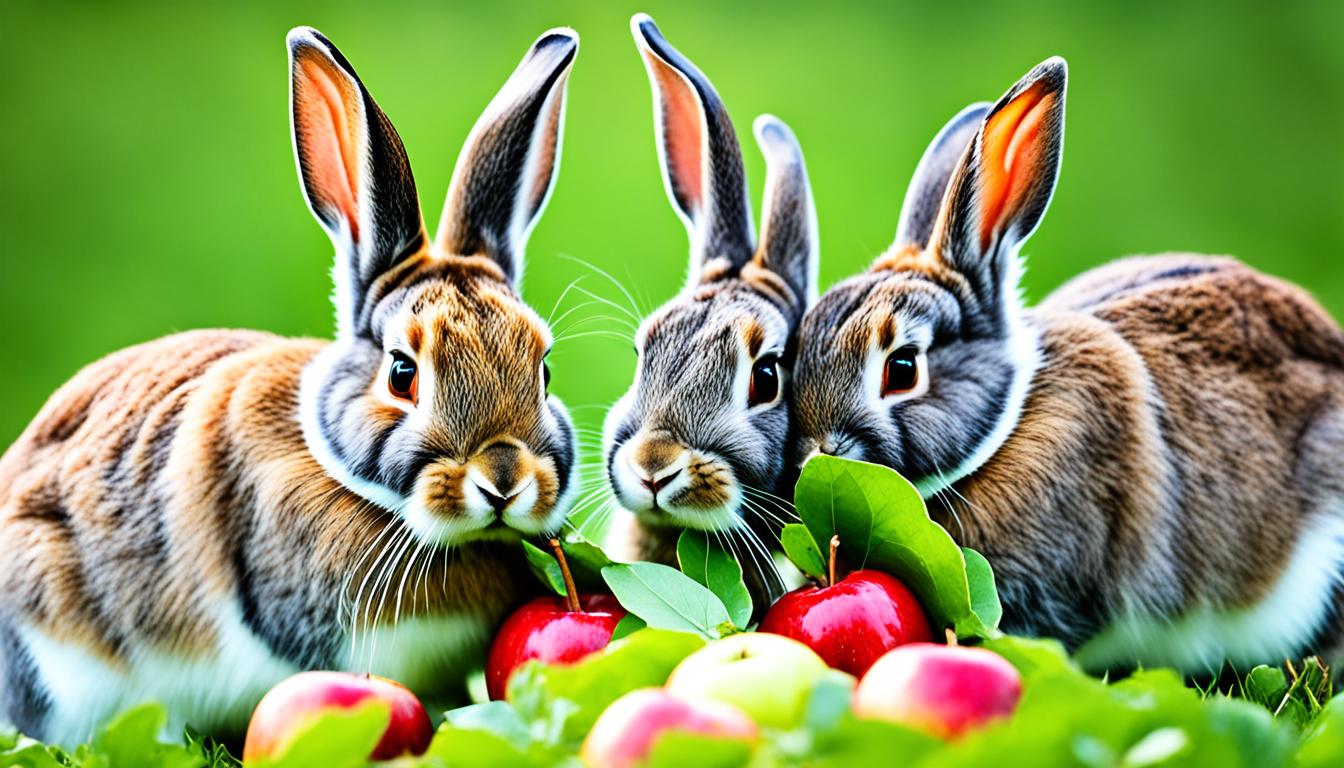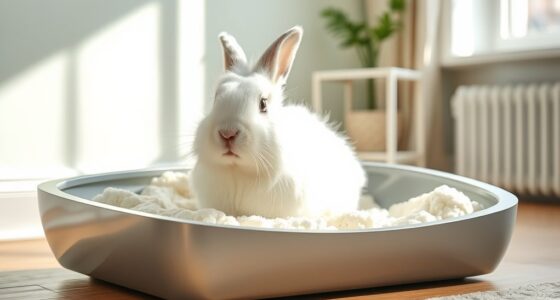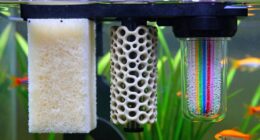Did you know that rabbits can enjoy the tart and juicy goodness of cranberries? While some fruits may not be safe for our furry friends, cranberries are a healthy and nutritious treat that can be added to their diet. Not only are cranberries rich in vitamins and minerals, but they also provide various health benefits for rabbits. Let’s take a closer look at how cranberries can be a tasty supplement to your bunny’s diet, all while prioritizing their health and well-being.
Key Takeaways:
- Cranberries can be a safe and enjoyable treat for rabbits when given in moderation.
- They are rich in vitamins, minerals, and antioxidants, which promote a healthy immune system and overall well-being in rabbits.
- It’s important to feed cranberries as a treat and not as a staple food to avoid digestive issues.
- Moderation is key when incorporating cranberries into a rabbit’s diet, and the recommended portion is a teaspoon of fruit per two pounds of body weight, once or twice a week.
- Dried cranberries should be offered in small amounts due to their higher sugar content.
The Health Benefits of Cranberries for Rabbits
Cranberries offer several health benefits for rabbits. They are rich in vitamins and antioxidants, which can help protect against issues like cancer, heart disease, arthritis, and cognitive decline. The antioxidants in cranberries also aid in reducing inflammation and promoting a healthy digestive system. Additionally, cranberries contain important minerals like potassium, copper, calcium, and magnesium, which contribute to overall good health in rabbits.
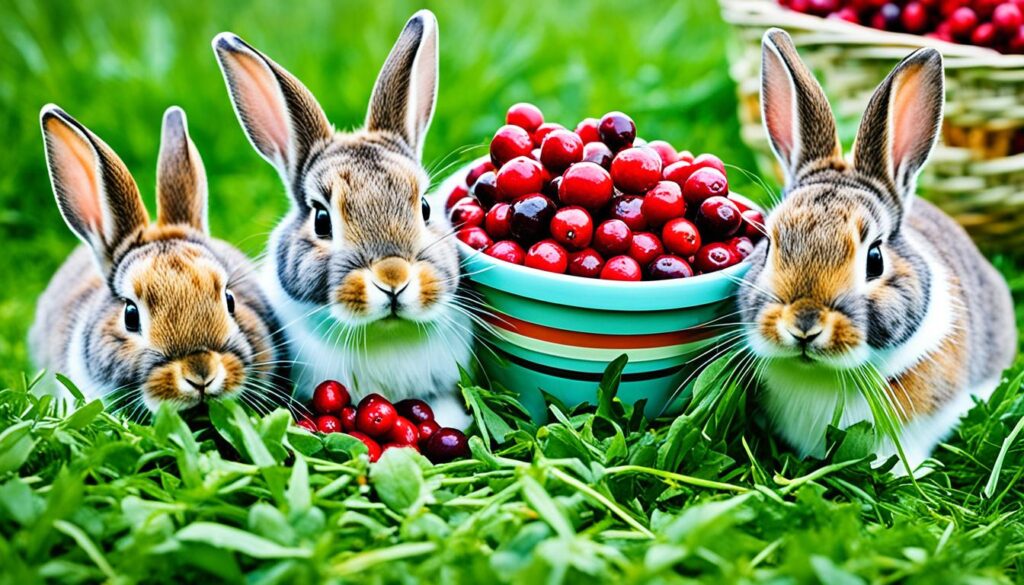
“Cranberries are a nutritional powerhouse for rabbits, providing them with essential vitamins and minerals that support their overall well-being.” – Dr. Alice Johnson, Rabbit Specialist
While cranberries are not a cure-all solution, they can help strengthen a rabbit’s body and promote a longer, healthier life. Adding cranberries to a rabbit’s diet can be a flavorful and nutritious way to enhance their well-being.
Moderation is Key: How Much Cranberry Can a Rabbit Have?
When it comes to incorporating cranberries into a rabbit’s diet, moderation is key. While these tart fruits offer several health benefits, overfeeding can lead to digestive issues due to their high water and sugar content.
As a general guideline, it’s recommended to give rabbits a teaspoon of fruit per two pounds of body weight, once or twice a week. This ensures that rabbits can enjoy the nutritional benefits of cranberries without overloading their systems. Remember, fruits, including cranberries, should be treated as treats and not be given on a daily basis.
If a rabbit consumes too many cranberries, they may experience stomach upset. Signs of digestive discomfort may include diarrhea or soft stool. In such cases, it’s best to stop feeding fruit for a few days and offer hay and dark green leaves instead, which can help restore balance to the rabbit’s digestive system.
The Importance of Moderation
Feeding fruits, including cranberries, in moderation is crucial for maintaining a rabbit’s overall health. Overfeeding rabbits on fruits can contribute to weight gain and potential health issues like obesity, which may lead to other complications.
By following the recommended guidelines and practicing moderation, rabbits can enjoy the occasional treat of cranberries while maintaining a balanced and nutritious diet.
Monitoring Your Rabbit’s Well-being
It’s essential to monitor your rabbit’s well-being and adjust their diet accordingly. Every rabbit is unique, and their dietary needs may vary based on factors such as age, weight, and overall health.
If you notice any changes in your rabbit’s appetite, behavior, or digestive health after introducing cranberries or any new food, consult with a veterinarian. They can provide personalized recommendations and ensure that your rabbit’s diet remains balanced and suitable for their specific needs.
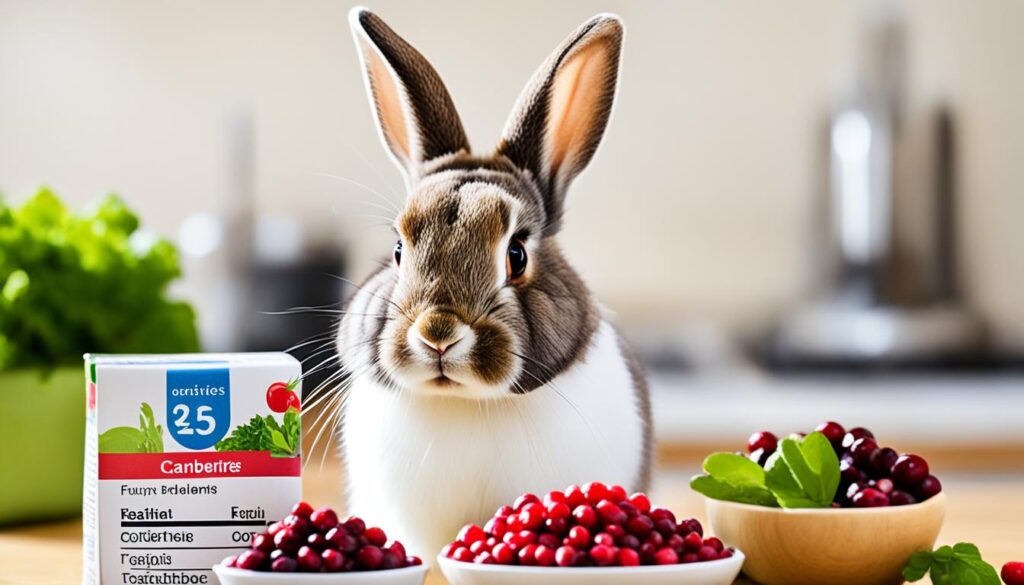
Summary of Cranberry Consumption for Rabbits
| Cranberry Consumption | Frequency |
|---|---|
| A teaspoon of cranberries per two pounds of body weight | Once or twice a week |
Inmoderation, cranberries can be a healthy addition to a rabbit’s diet. However, it’s essential to provide them in limited amounts, as overfeeding can lead to digestive issues and potential health problems. By following the recommended guidelines and monitoring your rabbit’s well-being, you can ensure they enjoy the benefits of cranberries without any adverse effects.
Dried Cranberries for Rabbits: Is It Safe?
While dried cranberries are not directly harmful to rabbits, it’s important to offer them in moderation due to their high sugar concentration. Dried fruits, including dried cranberries, have a higher sugar content than fresh fruits because of the reduced water content. Therefore, it’s crucial to choose dried cranberries without any additives and offer them sparingly.
Adding one or two dried cranberries a couple of times a week to your rabbit’s diet should be sufficient. Remember, dried cranberries should be considered as an occasional treat rather than a staple food in their bunny diet.
| Pros of Dried Cranberries for Rabbits | Cons of Dried Cranberries for Rabbits |
|---|---|
|
|
Additionally, it’s crucial to provide fresh water alongside dried cranberries to ensure proper hydration for your rabbit.
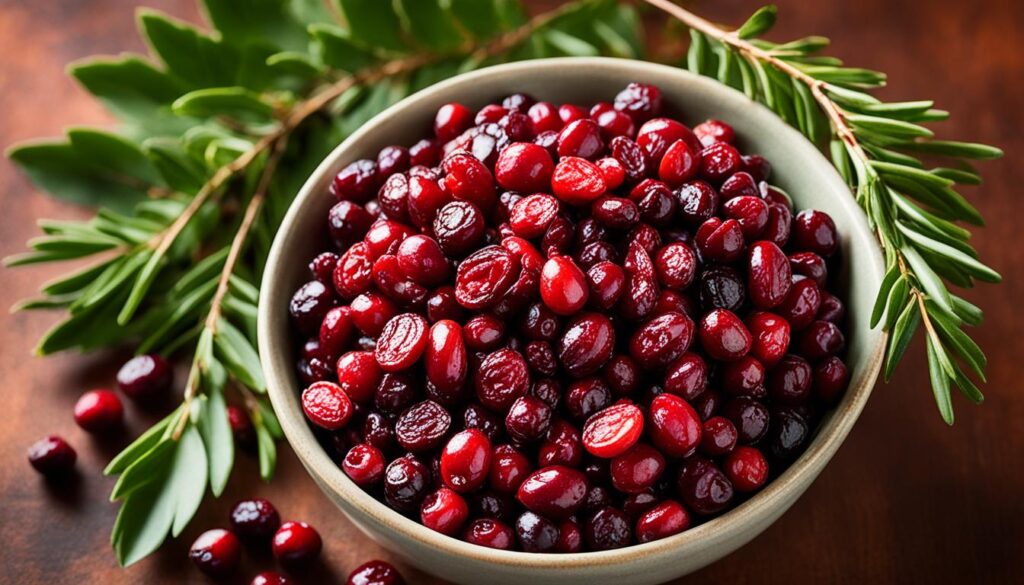
Can Rabbits Have Cranberry Juice?
No, rabbits should not be given cranberry juice. Rabbits need fiber, and juicing a fruit removes all the fiber, leaving only the concentrated sugar. Cranberry juice can cause a significant insulin spike in a rabbit’s body, which can be detrimental to their organs. It’s best to stick to fresh fruits, which contain more fiber and are better balanced for a rabbit’s diet.
Creating a Balanced Rabbit Diet
A balanced rabbit diet consists of several components. To ensure your furry friend stays healthy and happy, it’s important to provide them with a well-rounded diet that meets their nutritional needs.
The Importance of Hay
Hay should be the staple of a rabbit’s diet and should make up 80-90% of their daily food intake. The high fiber content in hay helps maintain proper digestive health and prevents issues like gastrointestinal stasis. Grass hays, such as Timothy, orchard grass, brome, and oat hay, are recommended choices for your rabbit’s hay.
High-Fiber Pellets
In addition to hay, rabbits should be given a small quantity of pellets that have a high fiber content. These pellets provide essential nutrients and support the overall well-being of your rabbit. When choosing pellets for your bunny, opt for those without added sugars, preservatives, or artificial colors. Consult your veterinarian for recommendations on portion size and suitable brands.
Incorporating Vegetables and Herbs
Vegetables and herbs can be included in a rabbit’s diet to provide variety and additional nutrients. However, it’s essential to introduce new foods gradually to avoid digestive issues. Some safe options include leafy greens like romaine lettuce, kale, and cilantro. Avoid feeding rabbits vegetables that are high in starch or high in oxalic acid, such as broccoli or spinach, as they can cause harm in excessive amounts. Always wash vegetables thoroughly and remove any pesticides before offering them to your rabbit.
Moderate Fruit Treats
Fresh fruit can be given to rabbits once or twice a week as a treat. While fruits contain essential vitamins and minerals, they are also high in sugar, so moderation is key. Some suitable fruit options for rabbits include apples, berries, and melons. Remember to remove any seeds or pits and wash the fruit thoroughly before giving it to your bunny.
Choosing Rabbit Treats Wisely
Rabbit treats should be fed sparingly and chosen carefully. Opt for treats that are specifically made for rabbits and free from added sugars, preservatives, and artificial colors. These treats should be given occasionally to prevent overfeeding and maintain a healthy weight for your rabbit.
Constant Access to Fresh Water
Lastly, ensure that fresh water is available to your rabbit at all times. This is crucial for their overall health and hydration. Regularly check and refill their water bowl or bottle to provide a continuous supply of clean water.
By following these guidelines and providing a balanced rabbit diet of hay, pellets, vegetables, fruit, and fresh water, you can ensure that your bunny receives all the necessary nutrients for a happy and healthy life.
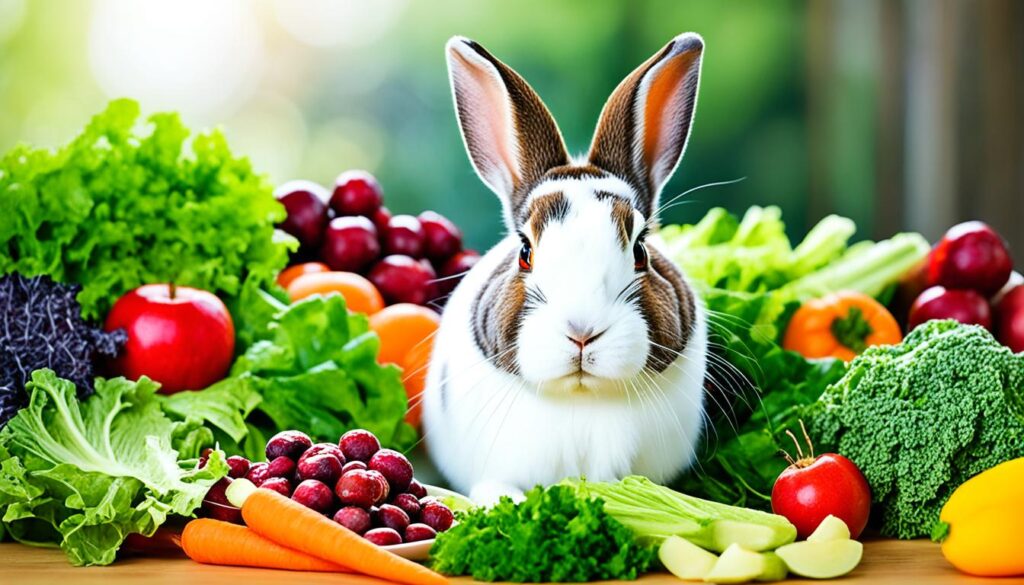
| Components of a Balanced Rabbit Diet | Serving Size/ Frequency |
|---|---|
| Hay (Timothy, orchard grass, brome, oat hay) | 80-90% of daily food intake |
| High-fiber pellets | Small quantity |
| Vegetables and herbs (e.g., romaine lettuce, kale, cilantro) | Introduced gradually |
| Fruits (e.g., apples, berries, melons) | Once or twice a week as a treat |
| Rabbit treats | Sparingly and free from added sugars, preservatives, and artificial colors |
| Fresh water | Constant availability |
Conclusion
In conclusion, cranberries can be a healthy addition to a rabbit’s diet. These tart berries are packed with essential vitamins and minerals that contribute to a rabbit’s overall health. However, it is important to offer cranberries in moderation, as they should be considered a treat rather than a daily staple. Overfeeding rabbits on cranberries or any fruits can lead to digestive issues and potential health problems.
To ensure a balanced bunny diet, it is recommended to include a variety of components such as hay, pellets, vegetables, and a limited amount of fruit. Hay should make up the majority of a rabbit’s diet, serving as a crucial source of fiber. High-fiber pellets and fresh vegetables can provide additional nutrients while promoting healthy digestion.
Regular monitoring of a rabbit’s weight is important to prevent obesity and other health issues. Adjusting their diet accordingly and consulting with a veterinarian for specific dietary recommendations can help ensure a rabbit’s well-being. Remember, a healthy rabbit diet is the key to a happy and thriving pet.
